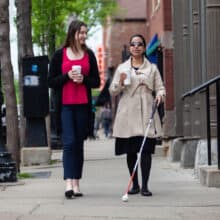Commentary: Including More Characters with Disabilities in the Media
Ever since I can remember, I have been interested in shows and movies that feature characters with disabilities. As someone with a disability, I can identify with many of these characters and am naturally drawn to characters that are relatable to me. However, I rarely see characters with disabilities represented in popular media, and I think that is why in the few instances that Hollywood features them, I am curious to see how disability is represented in the media.
I am not the first person to notice the lack of characters or actors with disabilities in Hollywood. A recent study showed that between 2007 and 2015, only 2.4 percent of characters in the top 100 movies of that time period had disabilities. In contrast, the 2010 U.S. census shows that 56.7 million, or 18.7 percent, of Americans have disabilities. Even in the rare instances when characters with disabilities are featured, I have found that more often than not that they are portrayed as being helpless or having special super powers.
Whether we like it or not, society is influenced by how the media portrays people of different minority groups, and this is also true for those of us with disabilities. Unfortunately, most people have never met, let alone interacted with, a person with a disability. Someone who has only seen or read the Daredevil comics might come to believe that all people who are blind have a stronger sense of hearing and other “superhuman” powers. There are some TV series, however — like ABC’s detective show and NBC’s sitcom, Growing Up Fisher, that I found to portray blindness and visual impairment more accurately. These shows had successful people with vision loss as the main characters, but both unfortunately lasted only one season.
Recently, there has been a lot of buzz and excitement among the disability community in the United States. ABC’s new sitcom, Speechless, will debut tomorrow, September 21, at 7:30 CST. Speechless is a sitcom about JJ, a child with a disability, and his family’s efforts to make him feel more welcome and included in his community and school. JJ is played by Micah Fowler, an actor who has cerebral palsy in real life. Shows like these have great potential for shedding light on some of the everyday issues that people with disabilities face. I look forward to watching this new sitcom, and hope it helps create more awareness about people with disabilities!
I am not saying that it is wrong to portray people with disabilities as having super human qualities – after all, everyone gets a good thrill from watching superhero movies! Hollywood and the media in general should include more characters and actors with disabilities in shows and movies. Society at large still remains unaware about the needs and obstacles faced by this population, and the media can go a long way in creating more awareness. The media has a great influence on how we interpret the world, and given that people with disabilities are considered the largest minority group in the United States, it is only fair for us to be more included in the entertainment industry.
How well do you think the media does portraying characters with disabilities in TV shows and movies? Please share your feedback and thoughts!
 Sandy Murillo works at The Chicago Lighthouse, an organization serving the blind and visually impaired. She is the author of Sandy’s View, a bi-weekly Lighthouse blog about blindness and low vision. The blog covers topics of interest to those living with blindness and vision impairments. Being a blind journalist and blogger herself, Sandy shares her unique perspective about ways to live and cope with vision loss.
Sandy Murillo works at The Chicago Lighthouse, an organization serving the blind and visually impaired. She is the author of Sandy’s View, a bi-weekly Lighthouse blog about blindness and low vision. The blog covers topics of interest to those living with blindness and vision impairments. Being a blind journalist and blogger herself, Sandy shares her unique perspective about ways to live and cope with vision loss.





